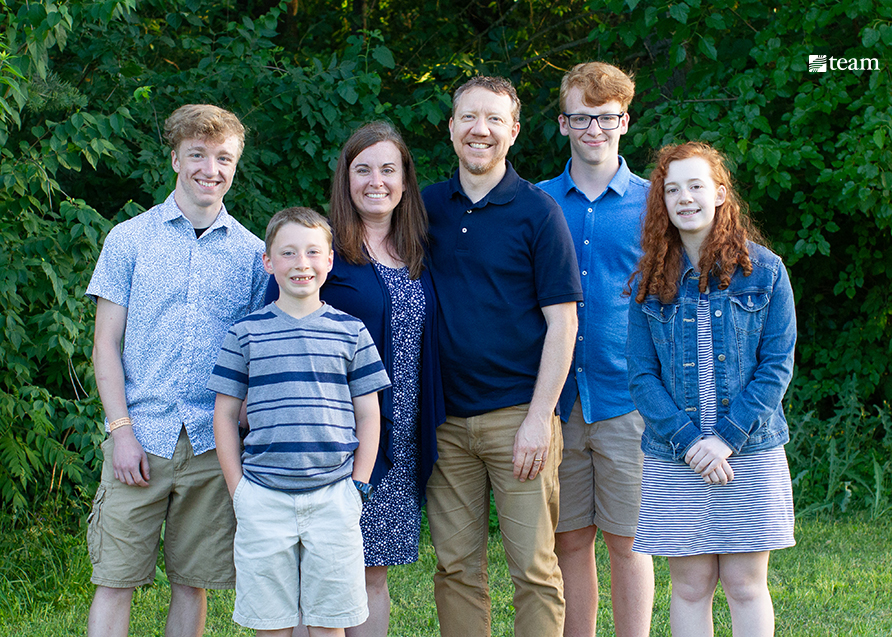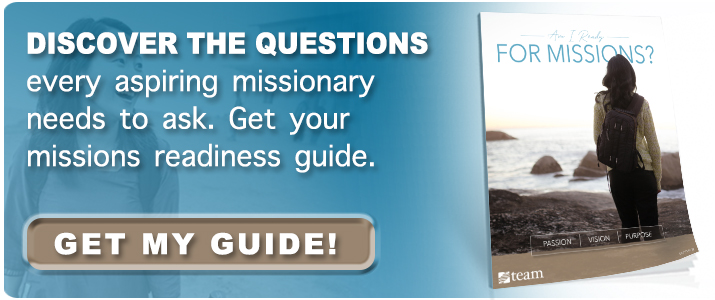
Becoming a Missionary
10 Not-So-Silly Questions You May Have About Missions
March 25, 2022
by Suzanne Pearson

Growing up I had a high school teacher with a poster in his class that read, “The only silly question is the one you didn’t ask.” In Mr. Johnson’s case, this referred to the complex world of algebra, but for potential missionaries, the dilemma can be the same.
If you’re considering going to the mission field, you’ve likely already thought about the “big” questions – what type of ministry you’ll do, where you’ll go, etc. But often, potential missionaries wonder about the day-to-day aspects of missionary life as well. Maybe you have some of these details swirling around in your head but feel silly asking about them.
In the spirit of good old Mr. Johnson (and with a little help from our friends at askamissionary.com), here are 10 Not-So-Silly Questions You May Have About Missions:
1. Can I be a missionary if I’m an introvert?
“Absolutely,” says Linda Brucato a TEAM Appointee Mentor who works with new missionaries. “Some of the best missionaries are introverts!”
As the Bible tells us in Romans 12:6-8 and 1 Corinthians 12:4-11, God gifts each believer differently, but all are equipped to serve Him and be a light to the world.
So rest assured, God uses different personality types on the mission field.
2. How poor will I have to be as a missionary?
“TEAM requires all missionaries to raise what we call a ‘living allowance,’” Linda explains. “This is a sum that is generally based on the average US teacher’s salary. TEAM also offers a retirement fund for Long Term missionaries to invest in as well as medical coverage.”
Anna Price, TEAM’s Director of Mobilization gives great insight on this issue as well. “Some missionaries feel called to marketplace ministry, taking a paying job overseas and being a light to coworkers,” she notes. “Either way, you may struggle with the idea that advancing your career looks entirely different as a missionary in comparison to the American dream. As God makes His call to global work clear in your life, talk to Him about your desires and expectations in this area, and be prepared for your lifestyle and career to look different than you thought it would.”
Read more about finances and raising support.
3. Will I have time for hobbies?
TEAM Mission Coaches assure potential missionaries that not only is leisure time accounted for on the mission field, but hobbies are an important part of missionary life. “Each missionary has a weekly day off,” says Linda. “Missionaries are encouraged to connect with their community and to find ways to relax and enjoy others.”
Further, hobbies can also open up new opportunities for ministry. TEAM’s Steve Dresselhaus (Mexico) is a great example. His current ministry was born out of his love for kayaking.
To hear from more missionaries about how God has used their hobbies, read here.
4. How will I get around? (Will I get a car? A motorcycle? Can I bring my bike?)
Transportation options are in large part determined by where you go. Many missionaries have cars, bikes, or motorcycles, and some use public transportation. Another consideration is the laws for driver’s licenses in the country where you serve – some will require you to obtain a license from that country while others will allow you to drive on your US driver’s license.
Joshua Kuhns, a TEAM Mission Coach who served in Southeast Asia, is an avid cyclist. He shares that he was able to bring 2 bikes with him to the mission field. “Cycling continued to be an integral part of my life and ministry there in South Asia in much the same way it had been for me in the US.”

Regardless of where you serve, your ministry supervisor will help you figure out the best transportation options.
5. Can missionaries get tattoos?
The short answer according to Linda is “Yes.” TEAM has no policy against tattoos, but it is important to know how tattoos, piercings, etc. may be perceived by the culture you serve in. For some regions, tattoos might create barriers to ministry, while for others, they might open doors for conversation and connections.
Read more here from missionaries on both sides of this topic.
6. How often can I go back home?
This will likely depend on your ministry area. In most cases TEAM missionaries get what’s called a “home assignment” every 2-4 years. There are also sometimes trips home for special circumstances like illness/medical needs or a family emergency. This is typically decided by your ministry supervisor.
Joshua notes, “There are lots of experiences and studies that show it is pretty important for reasons related to culture adjustment and community with the host culture, to not travel back home more than once per year. The timing of all travel, whether leisure or work-related, needs to be communicated with one’s supervisor in advance as much as possible.”
7. How do missionaries date and find spouses?
“Great question! How do you find them here?” laughs Linda. Like every good love story, the circumstances for dating and courtship will be unique for each missionary, and guidance is provided by the ministry supervisor.
“Many single workers wrestle with their call to missions and their desire for a spouse,” shares Anna. “TEAM encourages you to talk to God and your church community to give you peace about what may be a sacrifice in this area. Nancy Sturrock, a TEAM retired missionary once shared, ‘I need to be single with my whole heart and go about what He’s given me to do today.’”
8. Can I learn the language from an app?
“Language is essential, so TEAM puts a high priority on learning the language of the people you are going to serve,” says Linda. To that end, most missionaries attend a language school in the country where they will serve. Others have language tutors. Apps like Duo Lingo and others like it may be a good way to supplement a more comprehensive language study, or just to practice, but they shouldn’t be the main source of language learning.
Joshua warns that apps often fail to distinguish between a more formal way of speaking and everyday usage or slang. “You also miss out on learning the culture of the person you are learning from as you are engaging with technology versus building a relationship with a native speaker,” he adds. “Rarely would learning via even the best-constructed app program compare to learning from a native speaker in the native environment.”
9. Can I bring my dog?
Your best furry friend may be jumping in your suitcase, ready to travel the world with you! But it will depend on your ministry area and the details of your service as to whether he’ll be able to tag along. “It is dependent on the country, the ministry, and the recommendation of the ministry area leaders,” says TEAM Mission Coach, Trudy Kutz.
Trudy also cautions that it is important to remember that the time constraints and demands of learning a new language and culture at the beginning of an assignment may make it unwise to have a pet during the initial stages of your ministry.
10. Is there a place for “regular” Christians without special training?
Many potential missionaries wonder if they have the right qualifications for missions. The reality is that the mission field is filled with ordinary people doing extraordinary things for God’s Kingdom! But that doesn’t mean that you can jump on a plane tomorrow and be ready for effective ministry. TEAM mobilizes people with a heart to reach the world for Christ and then prepares and equips them to do just that!
Linda says it best: “TEAM will make it very clear what the requirements are and then help you meet them! We train all new missionaries before departure and then there will be further training in the ministry area.”
Deciding to answer the call to missions is a very big decision and it’s important to know the challenges and opportunities that may lie ahead. Talk to a TEAM Mission Coach today to have ALL your questions answered! (Mr. Johnson will be very proud of you for asking.)
Related articles


